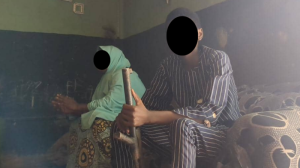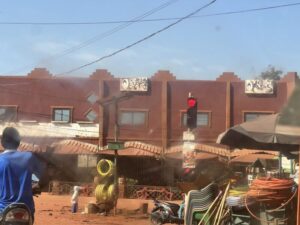The heightened insecurity in Benue State has forced the shutdown of numerous schools, casting a shadow on education and leaving a surge in the number of out-of-school children, especially in LGAs like Guma, where bandits and suspected terrorists have besieged communities. Safer Media Initiative (SMI) reports.
On November 21, 2020, Eunice Mase’s life took an unwelcome turn. It was a day she wished she could rewrite. On that fateful day, armed men suspected to be bandits abducted her 12-year-old daughter, Mercy, from her school in Tse-Ankyegh village, Mbawa council ward of Guma in Benue State. Mercy had been studying there for three years.
Prior to this, Mase had heard about coordinated attacks by herdsmen in nearby villages. However, she could not have foreseen that her own daughter would fall victim to her abductors one afternoon in November 2020.
Since that harrowing incident, Mase has clung to her other three children, vowing not to send them to a distant place for school until the threat of terrorist attacks subsides. The school in her village, where Mercy was abducted, had been shuttered due to parental fears of further abductions. The school teachers, fearing for their lives, had fled.
 Eunice Mase, mother of the abducted Mercy
Eunice Mase, mother of the abducted Mercy
Eunice Mase now resides in Udei. She has not seen her daughter in more than three years since she was kidnapped by suspected herdsmen on her way back from school. She still hopes that one day her daughter will return.
“I feel so bad that sometimes I hardly eat. I feel as if she will appear one day,” she said as her eyes fluttered, trying to fight the barrage of tears.
She narrated: “On November 21, 2020, the Fulani herdsmen invaded our village, killed some people, and made away with so many people alive, including my daughter, who was on her way to school. Till today, we do not know her whereabouts.”
Mercy’s abduction is just one of numerous cases of children falling victim to the escalating insecurity plaguing Benue communities. Across various parts of the state, especially in the Guma LGA, armed conflict and criminal activities have instilled fear, making the parents and the children desert their homes to makeshift huts in the government’s IDPs camps.
Zendesha Joseph went through a similar ordeal when her daughter was kidnapped with four other pupils while coming back from school sometime last year.
Joseph, who is from Tse-nundu village, Guma LGA, said the other students abducted during the attack have since returned, but her daughter has not been found since the incident.
While Joseph and Mase had similar experiences, their stories resonate with the broader issue in Benue and the thousands of cases across Nigeria of children who have either been abducted or lost their lives in the pursuit of education.
This alarming trend continues to exacerbate the crisis of out-of-school children, particularly in the northern region, where the persistent threats of banditry, communal clashes, and terrorist attacks have a profound impact.
Shattered aspirations
Terhemba Raphael, a 17-year-old with dreams of becoming a medical practitioner or a lawyer, saw his ambitions crumble in 2020. The onslaught of terrorists on his village, Agankasi, left a trail of devastation—claiming the lives of his loved ones, reducing his home to ashes, and annihilating his family’s possessions. Since that harrowing incident, Raphael has found refuge in a IDPs camp, compelled to abandon his educational aspirations.
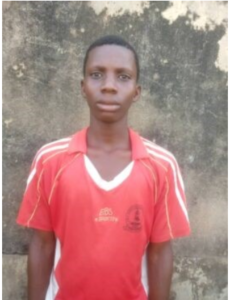 Terhemba Raphael, 17, has been out of school for over three years due to insecurity
Terhemba Raphael, 17, has been out of school for over three years due to insecurity
Raphael was in junior secondary school when the suspected herdsmen attacked his village, and ever since then, his parents could not afford his school fees as they lost their means of farming or trading.
“The herdsmen attack brought us to the camp. The attack has affected my educational journey because sometimes my parents could not afford my school fees. For that, I have been dropped out of school,” Raphael narrated.
Raphael, uncertain about reviving his dream, appealed to the government to address the insecurity situation, allowing him to return home and resume his education.
Like Raphael, Jato Cynthia’s dream of a future shaped by education is now on pause.
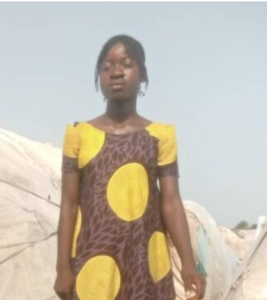 Jato Cynthia
Jato Cynthia
She has been forced out of school for over three years when terrorists attacked her village bordering Nasarawa state.
“It is the farming crisis that brought me here (to the IDPs camp). The insecurity affects my education so well because my parents can no longer afford my school fees, thus leaving me out of school for a long time,” Cynthia told SMI.
The exodus from their homes in pursuit of safety has not brought any noticeable changes in the livelihoods of numerous individuals within these areas. Amidst seeking refuge, many continue to grapple with dire challenges, facing not only the trauma of displacement but also struggling to sustain their daily lives.
Several other children who spoke with SMI echoed similar feelings—the fear that their dreams of pursuing education, especially up to secondary level, will fade away.
Mama Kwaghkunda Tsekaa, a 65-year-old, highlighted the impact of insecurity in Guma LGA on the education and well-being of their children. Although her own children are still attending school, she pointed out significant challenges such as a substandard environment, poverty, and the constant fear of attacks within the IDPs camp.
She spoke in her native Tiv language through an interpreter.
She said: “So bad that we never imagined the gravity. We lost our home, farm lands, and properties, and even people in our neighborhood, to the herdsmen attack. Another striking thing is the higher level of poverty experienced now than before. Because we cannot effectively feed ourselves, we depend on humanitarian aid for survival.
“It greatly affected me, especially my small boys. I have grown up with children who have even gone to higher institutions, while others left here to settle in other places. But we cannot doubt the fact that the crisis has really affected the overall education and wellbeing of our children.”
Over 50 schools remain closed, teachers scamper for safety
While it is more difficult to independently place the actual figure of the number of schools affected in Benue State, where bandits have continued to launch their attacks, SMI gathered from the Guma LGEA Secretariat at Gbajimba that over 50 schools have been closed due to insecurity.
Most of these schools, which cut across the ten council wards of the LGA, are located in deserted villages and towns, with a significant number of the schools being burned by the bandits, while a number have been turned into an IDP camp.
SMI also gathered that over 15 teachers lost their lives during the attacks on some of these villages in Guma, prompting many other teachers to transfer their services to the major city for safety.
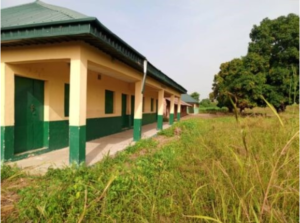 LGEA Primary school Inundu, Mbanyiar Mbawa, Gbajimba
LGEA Primary school Inundu, Mbanyiar Mbawa, Gbajimba
The implications of the situation became evident during SMI’s visit to some affected schools on Monday, November 20. At Inudu LGEA Primary School, the bleak scene unfolded as SMI discovered that the surroundings of the three classroom blocks were overgrown with bushes, showing no signs of use for an extended period.
Investigations uncovered that under the zonal intervention projects, UBEC had contracted Ultimate Civil Design Consult Nigeria Limited to construct a block consisting of two classrooms for the school. Despite the completion of this construction, the classrooms remained untouched, echoing the villagers’ desertion of the community.
A similar scenario played out during SMI’s visits to Tse Dei LGEA and Mbakuyor LGEA schools. The schools, eerily silent and visibly unused, mirrored the fact that the people they were meant to serve have fled the communities for safety.
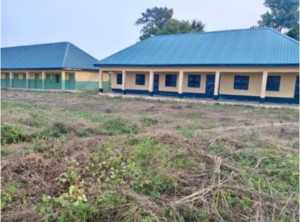 LGEA Primary School Mbakuyor, Guma LGA, has also been shut down over the years due to insecurity attacks.
LGEA Primary School Mbakuyor, Guma LGA, has also been shut down over the years due to insecurity attacks.
Speaking to SMI, the Education Secretary of the Guma LGEA secretariat at Gbajimba, Guma LGA, Alaaga Genger, decried that over 90% of schools in the area are not functional as a result of insecurity and a lack of teachers who have transferred their services to major towns in the state for safety.
Some of the affected schools, as listed by the LGEA secretary, are: LGEA primary schools: Gbayange, Tse-gwa, Apera, Ormegha, Tsokuna, Mbabegha, Agbaka, Dam Awa, Gbajimba, Iortyom, Usoughul, Tsekereke, Yogbo, Igbenke, Ingbian, Tugudu, Tsegar, Gberkon, Tse-avine, Kula Yemen, Magum, Makondu, Amah, Asamgabaa, Tarma, Gwa Adudu, Aninge, Bua Dyu, Anusu, Igyorlugh, Akeja, Adai, Ali-Agudu, Orkpe, and Akaakuma. Others are Junior Secondary School Torkula, UBE Tyulen, and RCM Primary School Uhembe.
Morning and afternoon classes in Central Primary School, Gbajimba
As he emerged from the main entrance at Central Primary School, Gbajimba, into a moderately big classroom on a very sunny Friday afternoon, Aondoaseer Ordue was covered with sweat as he tried to find his seat. He was about 30 minutes late to the class, but his teacher knew he had to cover a very long distance to attend the classes.
 Aondoaseer Ordue
Aondoaseer Ordue
Ordue, a sixth-grade pupil who used to attend LGEA Primary School Tsokuna, now joins numerous other students in making the long trek to Central Primary School due to the non-functionality of their respective schools. Moreover, students living in a nearby IDPs camp also avail themselves of the educational opportunities provided by the school.
“Insecurity badly affected me in terms of going to school, family settlement, and peace of mind as a child. We used to play freely as children, but since the incident, fear of the unknown has taken over.”
He continued: “For me, my parents brought me here to the LGEA Central Primary School in Gbajimba to complete my primary education, but the rest of my brothers are at home doing almost nothing.”

A cross-section of primary six pupils at the LGEA Central Primary School Gbajimba (most of them were displaced from their former schools due to insecurity)
SMI gathered that this school stands as the only functional public school in the vicinity. It accommodates a significant number of students each day, which explains its current capacity, hence the need to operate morning and afternoon classes throughout the week.
Another primary six pupil, Sunday Orgunga shared a similar plight with Ordue: “Though my parents brought me here, it is often a sad moment trekking under the sun every afternoon to attend classes. We never prayed for this bad experience, but we are suffering greatly from it.”
While explaining how the development has come, the head teacher of the school, Adule Aondowase, explained that the Benue State Universal Basic Education Board (SUBEB) directed the pupils from the affected schools to undergo a free education at the Central Primary School, but the hope of those pupils remains a mirage.
He pointed out that the long distance to school discourages students.
“Despite the fact that we have divided the LGEA Gbajimba Central Primary School into two sessions, morning and afternoon (7:00 a.m.–12:00 p.m. and 12:30–5:00 p.m.), we still have a very big problem due to a lack of teachers and the population of pupils outweighing the structures on the ground. Now, a teacher is taking more than a hundred pupils in a class, which is against the standards,” He lamented.
Residents said living at the IDPs camp is demoralising
Tsokase James, 52, is one of the thousands of people who have suffered the brunt of insecurity in his community. His house was burned, and he had to run through the middle of the night to get to the internally displaced persons centre to hide his head.
“In 2014, on the 23rd of June, our community and school at LGEA Primary School Yogbo were attacked by herdsmen. That was the beginning of our problem, and since then, it has been an incessant attack that has made the people flee for safety,” James narrated.
SMI asked him about his perspective on the repercussions of insecurity on the children.
He replied: “Honestly, the state of these children is indescribable. The IDP camp life is demoralising and disheartening. Confidence seems elusive. Coping with the fundamental needs of life—food and shelter—are their paramount struggles, to say the least.”
Out-of-school Children in Nigeria
The United Nations Educational Scientific and Cultural Organization (UNESCO) 2020 Model Estimates on Out-of-School Children, published in 2022, states that almost 20 million Nigerian children are out of school. The data also shows that the secondary school out-of-school population has grown by 61 percent, from 6.3 million to 10 million since 2010, while the number of primary school-aged children who are not in school has also increased by 50 percent, from 6.4 million to 9.7 million since 2010.
Globally, this puts Nigeria as the country with the third highest number of children deprived of education, only behind India and Pakistan. One of the biggest factors responsible for this humanitarian disaster is insecurity, according to UNICEF.
In most of the communities affected by insecurity, particularly Guma, the communities have been deserted and the schools remain closed, thereby putting the primary and secondary education of the children on hold.
Lingering crises
For the past eight years, Benue State has grappled with escalating insecurity. Official records from the state death register between 2015 and March 2023 reveal a grim toll of over 5,000 lives lost solely to attacks by herdsmen during the former governor Samuel Ortom’s tenure, from 2015 to March 2023.
The impact is devastating—millions worth of properties destroyed, thousands injured, and a mass exodus from homes. Over the past eight years, communities have endured relentless attacks, hoping for a reprieve.
Eighteen out of 23 LGAs, including Guma, have faced insecurity, enduring attacks from non-state actors. The former governor, Samuel Ortom, even fingered state actors for being involved.
According to the state government, herdsmen-led attacks claimed 1,177 and 809 lives in 2015 and 2016. The toll continued, with 43 and 440 deaths in 2017 and 2018. The count reached 174 deaths in 2019, 88 in 2020, a staggering 2,131 in 2021, followed by 172 in 2022, and 104 since 2023 began.
Rooted in issues like open-grazing disputes, conflicts between herders and farmers, communal clashes, and criminal activities, the toll in deaths and displacement is stark.
Since March, after the presidential election, attacks have intensified. In April alone, at least 95 lives were lost in attacks across various LGAs, including Otukpo and Guma, over a chilling three-day span.
Available data might not fully capture the extent of damage, as some incidents go unreported.
State Government keeps mum
On Monday, December 18, SMI, via this reporter, contacted the state Chief Press Secretary, Tersoo Kula, seeking reactions to its findings and inquiring about the state government’s efforts to facilitate the return of students forced out of schools to their classes.
However, as of the time of filing this report, no response has been received from him.
This investigation is produced by Safer-Media Initiative with the support of the Wole Soyinka Centre for Investigative Journalism (WSCIJ) under The Collaborative Media Engagement for Development, inclusivity and Accountability Project (C-Media Project) funded by the MacArthur Foundation.


